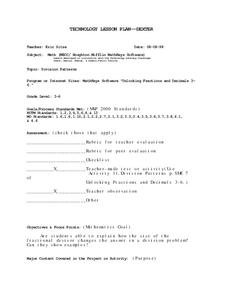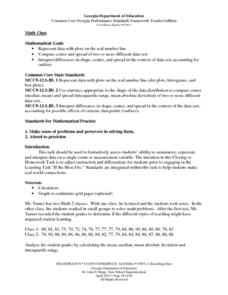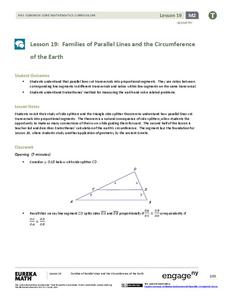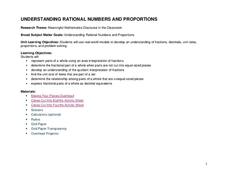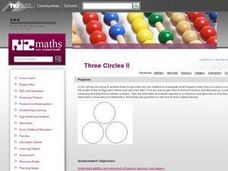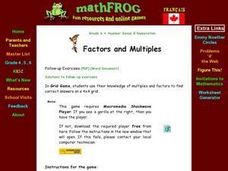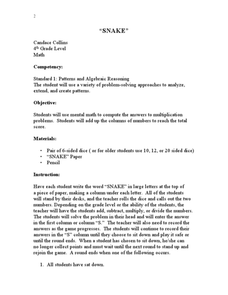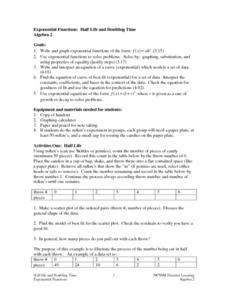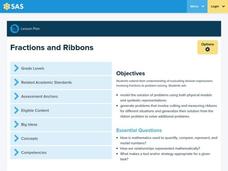Curated OER
Recipe For Disaster
Learners play an interactive game online to learn ratios. In this statistics lesson, students solve problems in an online game about ratio and relating statistics to the real world. This lesson provides hands on as well as teaching time.
Curated OER
Sad Seasick Sailors
Students role play the voyage on the Mayflower. In this United States history lesson, students play the parts of Pilgrims and sailors and discuss how to solve various conflicts during the "journey."
Curated OER
Multiplication Versus Addition
Second graders create arrays to study multiplication. In this multiplication lesson, 2nd graders split into teams to complete a multiplication table. One team uses addition to solve the table while the other uses multiplication. Students...
Curated OER
Division Patterns
Learners investigate the concept of division and how numbers fit into specific patterns while practicing the skills finding equivalent fractions. They practice solving different division sentences while answering questions asked during...
EngageNY
Dividing Fractions and Mixed Numbers
Class members discover how to extend division to fractions to mixed numbers. Individuals first review how to convert mixed numbers to improper fractions and then apply division strategies learned in previous lessons. A memory game tests...
Georgia Department of Education
Math Class
Young analysts use real (provided) data from a class's test scores to practice using statistical tools. Not only do learners calculate measures of center and spread (including mean, median, deviation, and IQ range), but also use this...
EngageNY
Families of Parallel Lines and the Circumference of the Earth
How do you fit a tape measure around the Earth? No need if you know a little geometry! Pupils begin by extending their understanding of the Side Splitter Theorem to a transversal cut by parallel lines. Once they identify the proportional...
Curated OER
More Pizzas and Things
Students are introduced to the problem by playing a guessing game of "I am a number, which is half of 6 and 6, what am I?" They explain their answers and see if anyone else had an alternate solution checking for reasonableness.
Curated OER
Reading to Calculate
Pupils examine the calculator. For this math lesson, students use the directions to learn how to use a calculator. Pupils apply the knowledge and solve problems using the calculator.
Curated OER
Understanding Rational Numbers and Proportions
Students explore parts of a whole. In this fraction lesson, students determine what makes a fair share. Working with manipulatives, students solve mathematical problems containing fractions.
Curated OER
Three Circles II
Fourth graders practice a variety of strategies when investigating what happens when they put various numbers into circles of a configuration: they express a fraction as a decimal, write and solve problems involving decimal...
Curated OER
Pirate Swords
Students read the math problem and retell it in their own words. They brainstorm for ways to solve and use questions to focus on the steps used. Students could use other problems involving pirates from the given website.
Curated OER
Factors and Multiples
Sixth graders need to see the relevance in the mathematics they learn. This lesson builds on the concepts of least common multiple and greatest common factor. The lesson presents real-world problem situations for students to solve.
Curated OER
Fickled Fractions
Students explore which fractions are made real in our world. They also show the relationship of cross multiplication and equivalent fractions To reinforce fraction skills.
Curated OER
Diophantus II
Learners use an ancient math game to establish the context for solving problems by investigating them in a systematic and mathematical way. They also need to have the ability to solve various types of equations.
Curated OER
Group Rope Squares
Students study how to better their cohesion and communication skills. In this investigative lesson students work in teams and learn how to communicate better as they help to solve problems and communicate their needs.
Curated OER
Math Activity: "Snake"
Fourth graders explore patterns by participating in a class math activity. For this early algebra lesson, 4th graders utilize a die and chart to keep record of a snake game in which students must utilize a math function to solve a...
Curated OER
Fruity O Fractions
Fifth graders become mathematical problem solvers using cereal to help demonstrate fractions and equivalent fractions. They use a graph to represent the data, and to compare fractions.
Curated OER
Negative Magic Squares
Magic squares are interesting objects in both mathematics proper and in recreational mathematics. So they are objects that children should have heard about and experienced. The problems in this sequence give students the opportunity to...
Curated OER
Exponential Functions: Half Life and Doubling Time
Students investigate the concept of exponential functions and how they increase in size over time. They simplify the functions in order to find the solutions that are possible and perform analysis of the curved line that is produced when...
Curated OER
Summary of Techniques of Integration
Students define and review techniques for integration by parts. In this calculus lesson, students solve rational expression using integration and apply the partial fraction rule. They practice solving problems online.
Curated OER
Infinity
Learners determine the sum of an infinite geometric series. In this determining the sum of an infinite geometric series lesson, students discuss how the sum of an infinite geometric series is a paradox. Learners use the sum of an...
Curated OER
Fractions Continued
Learners investigate the concept of using fractions to solve problems involving rational numbers. They order real numbers on the number line with the classification of fractions. Also students solve problems using the four operations...
Pennsylvania Department of Education
Fractions and Ribbons
Fifth graders solve division problems using partial quotients. In this long division lesson, 5th graders practice seeing division as a process of repeated subtraction and estimation. This lesson provides a script for the teacher.





